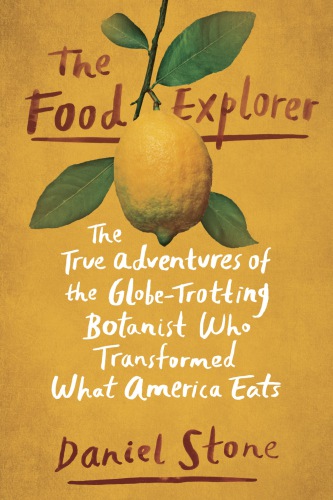
The Food Explorer
The True Adventures of the Globe-Trotting Botanist Who Transformed What America Eats
کتاب های مرتبط
- اطلاعات
- نقد و بررسی
- دیدگاه کاربران
نقد و بررسی

November 13, 2017
Journalist Stone tracks the journeys of botanist David Fairchild (1869–1954), who changed American eating habits and agricultural practices by introducing a wide array of new crops and varietals. Making extensive use of Fairchild’s notes and writings, Stone elucidates Fairchild’s experiences across the globe during the late 19th and early 20th centuries. Fairchild’s efforts are responsible for American familiarity with the Hass avocado, the hops that fueled America’s beer makers, and the Egyptian cotton that transformed the desert Southwest, not to mention kale, cherry blossoms, soybeans, dates, and many other items. Stone builds suspense while describing the trials and tribulations associated with global travel of that period. He also investigates the inner working of Washington politics while detailing the battles between Fairchild, who wanted a free hand to import plants to boost the country’s economy, and those who thought that such introductions might do grave damage to native species. Stone also uses some of Fairchild’s experiences to discuss the way colonization was perceived at the onset of the 20th century. Photographs largely taken from the collection of the Fairchild Tropical Botanic Garden in Coral Gables, Fla., enrich the text. Foodies and scientists alike will appreciate Stone’s informative and entertaining book. Illus. Agent: Lauren Sharp, Aevitas Creative.

January 1, 2018
Stone (editor, National Geographic) takes readers on a whirlwind tour of the life and agricultural successes of David Fairchild (1869-1954), a botanist whose collecting expeditions introduced avocados, Egyptian cotton, and dozens of other new foods to American farms in the first decades of the 20th century. Stone follows Fairchild's initial forays into plant collecting with a wealthy patron aboard luxury vessels as well as his career as a Washington bureaucrat heading the Office of Seed and Plant Introduction. Fairchild's extensive correspondence and published writing take center stage as Stone uses the sources to paint a vivid picture of a man with an insatiable curiosity and clear sense of purpose, traveling during a time when colonialism and nationalism created barriers to safe travel and effective cross-cultural communication. The narrative charts the rise and gradual fall of American interest in plant introduction, which eventually prompted Fairchild to leave public service in the years after World War I, and makes a convincing argument that his contributions to botany and agriculture were substantial and lasting. VERDICT This fascinating read will appeal to those interested in American history and food culture, travel narratives, and agriculture.--Rebecca Brody, Westfield State Univ., MA
Copyright 2018 Library Journal, LLC Used with permission.

January 15, 2018
The story of an intrepid botanist who exposed America to myriad exotic plants and food crops.While conducting research for an article, National Geographic staff writer Stone stumbled on a map showing the origins of popular foods that became domesticated in America. This discovery, as well as the author's lifelong fascination with tropical fruit, spurred a great exploration for perennially curious American botanist David Fairchild (1869-1954), who scoured the planet foraging for new foods and plants with which to enrich and tantalize American palates. Employing dogged research and close scrutiny of his subject's letters, rough drafts, and "ponderings on the backs of envelopes and napkins," the author delves into many different aspects of Fairchild's life. These include his seafaring adventures visiting more than 50 countries, his insatiable hunger to uncover new produce varieties and promote homeland agricultural development, and the harsh criticism his work continually garnered. Fairchild's assignments as a junior scientist with the then budget-challenged Department of Agriculture in Washington, D.C., and encouragement from world-traveling philanthropist Barbour Lathrop whetted his wanderlust for far-flung destinations, where he came across such exotic plants as the Hass avocado in Chile, seedless grapes in Padua, cherry blossoms in Japan, and potent hop plant flowers in Bohemia, which pointed to significant beer-crafting potential. Stone also provides details of the political struggle Fairchild faced. While his work enriched the agricultural climate of the country, congressional opponents felt that his methodical importation of new, farm-sourced, organic plant and produce varieties would compromise and even jeopardize native botanical species. Narrated in vividly realized, richly descriptive text with accompanying photographs, Stone's biography reanimates the legacy of an important contributor to the botanical diversity of America. Indeed, Fairchild's agricultural discoveries revolutionized the formerly bland eating habits of Americans and helped establish the country's own culinary identity.An erudite and entertaining historical biography of a food pioneer with particular interest for gastronomes and agriculture enthusiasts.
COPYRIGHT(2018) Kirkus Reviews, ALL RIGHTS RESERVED.

























دیدگاه کاربران